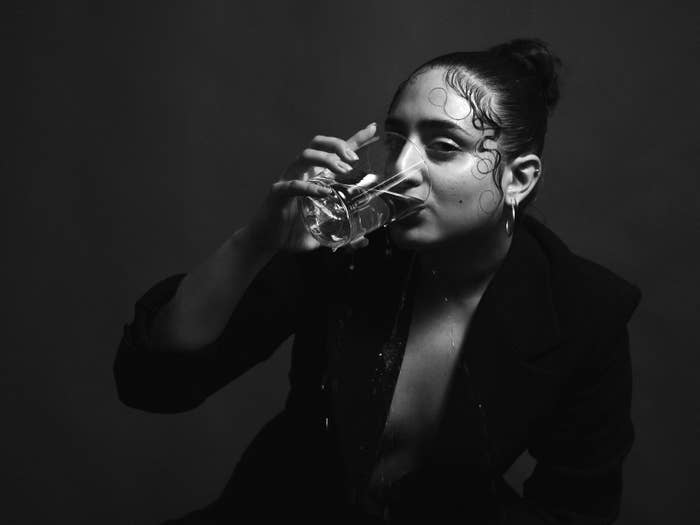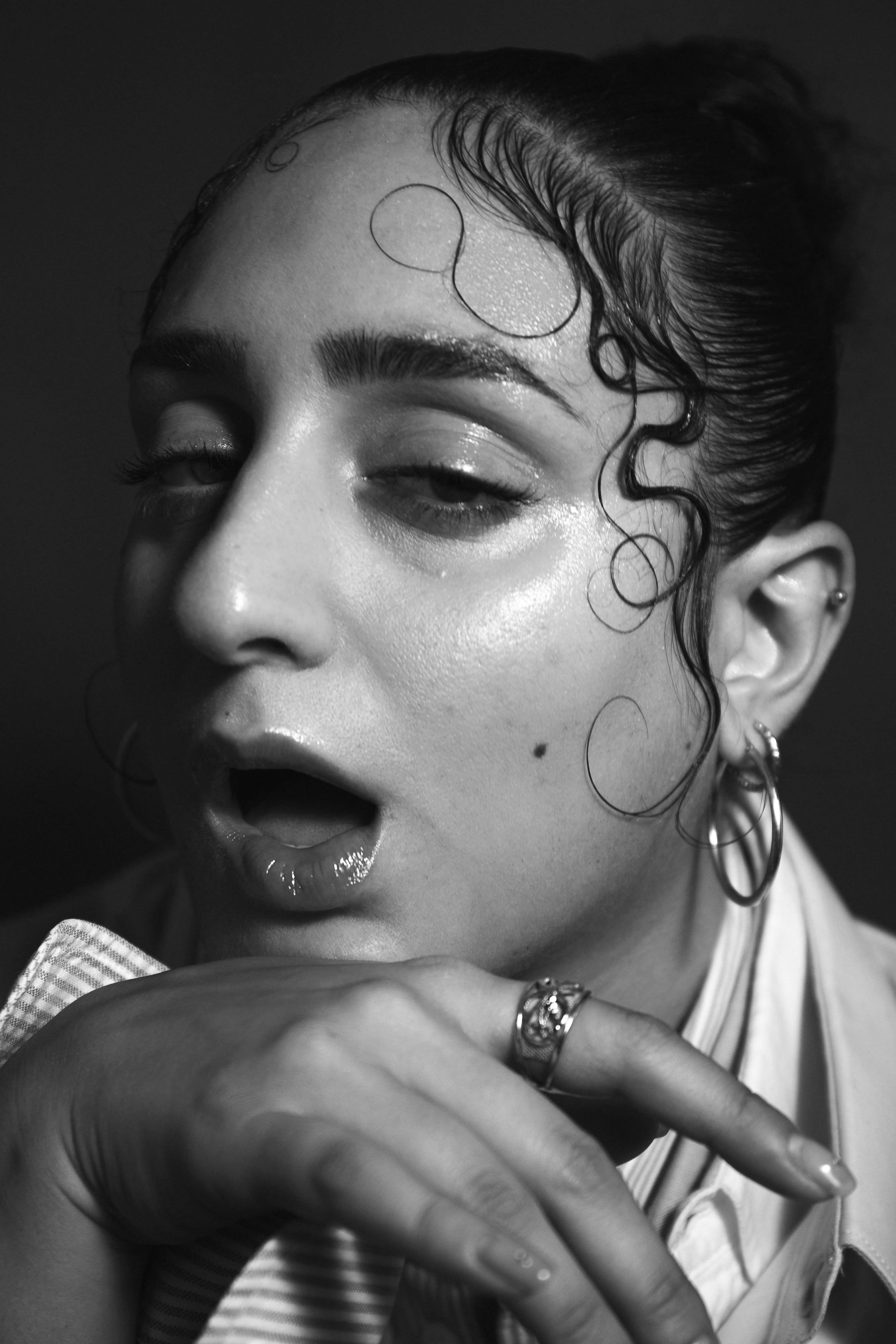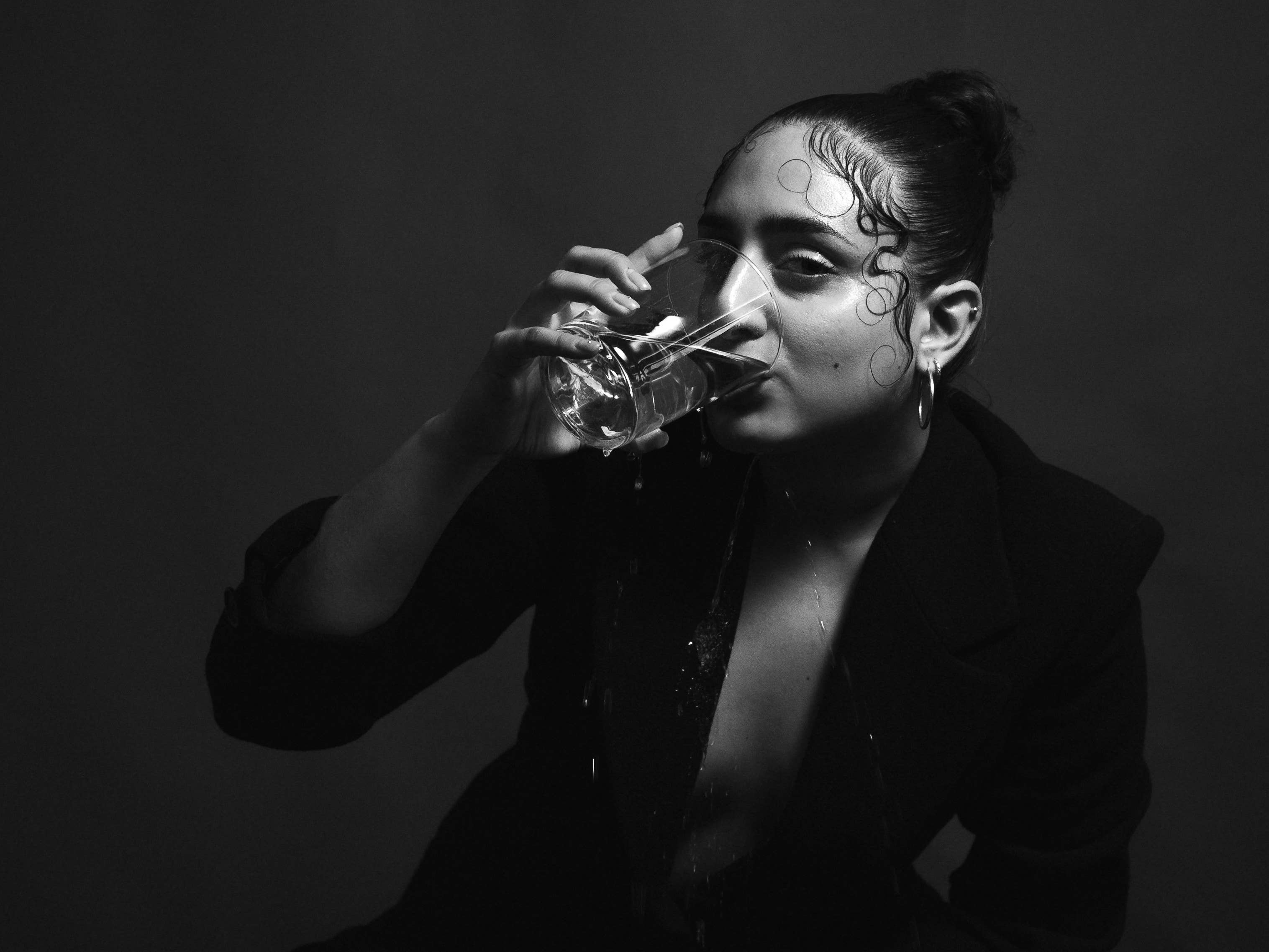
Calling me from her Stockholm apartment, Nadia Tehran excitedly shares her plans to attend a friend’s album release party in a few hours. As she sits at the other end of our Trans-Atlantic conversation, she asks what the time is for me. Although the singer, songwriter, and producer is getting her evening started, Sweden’s nine hours ahead. “Thanks for waking up so early,” she laughs.
The daughter of Iranian refugee immigrants, Nadia Tehran was born in Sweden and initially grew up in the city of Jönköping. Yet after her family relocated to a small town in Sweden’s Bible Belt, she instantly became the only person of color in her school. Enduring constant bullying and ridicule, Tehran turned to online forums to share music with like minded people.
“Around this time, I really felt like I was a misfit, like I didn’t belong,” she explains. But it was the Internet that allowed her to discover punk music, and she soon after began to play in bands. Over the years, Tehran gained distinction for her fiercely political music. Perhaps no other example is better than her 2016 track “Refugee” and its accompanying music video, which was illegally filmed in Iran.
However, her debut studio album Dozakh: All Lovers Hell offers listeners a different perspective, one which puts her emotional vulnerability on full display. The project took over a decade to make and offers a wide range of sounds, including both punk cuts and pop songs. Tracks such as the despondent “What About Me” see Tehran questioning why she is not desired by her lover, while the intoxicating “Alcoholic Waves” examines the pitfalls of her own vices.
Yet on the album, Tehran makes clear that her sadness doesn’t originate exclusively from romantic heartbreak—it stems from the heartbreak of oppression as well. Her activism remains omnipresent, particularly with songs like “Nazi Killer” and “Jet,” where she examines her treatment as a refugee as she proclaims, “Apology? Not from me / Dior head to toe / Yeah, I came here on a boat.”
At face value, Tehran’s project may seem nihilistic or even angry, but there are glimmers of hope within. If anything, it feels more like Tehran’s own version of purgatory than it does her hell.
What’s the punk scene in Jönköping, Sweden like?
I grew up in a very quiet, very white Christian neighborhood. I think I was always feeling alienated, so it was a liberation for me to find punk music and to find the punk scene. The scene wasn’t that big, but the people in it were very dedicated, and for me finding a place where my otherness was actually something interesting to people was very liberating.
Actually, the way I got to be in my first band was I downloaded some old Yeah Yeah Yeahs demos that I found online and I sent them to the band. I told him it was me, and they were like, "You should come play with us," and that’s how it started. [Laughs]
How did you get exposed to punk at 13 years old?
When I was 12, my family moved from the city to an upper middle-class suburb, and I suddenly became the only person of color. I think that’s when I started to become alienated. I became very lonely—I really was a loner around that time. But the Internet was a place for me to find forms of people who had things in common with me. It was groups like Joy Division and the Smiths and Black Flag, those types of bands. I think that was a loner's perfect paradise, because it was super dark, depressing music.
What was the studio process like for Dozakh?
It’s been a bit messy. Some of the songs have been written 10 or 15 years ago, when I recorded something on my phone or on my computer. I carried these songs with me for years and picked them up again, or somebody else produced on them and then I held onto it for a couple more years. It’s not like I went into the studio all at once. All of the songs have had different processes and have been recorded at different times in different places throughout the years.
Two years ago, I met DJ Haydn after searching for someone who would just sit down with me and bring it all together. He was really into the music and loved it so much, so we went into the studio here in Stockholm and took all the stems from over the years from all these different devices that they’ve been saved on, and we collected everything and put the songs together. Some of the songs we produced on more, and some of the songs we stripped completely of their previous production. And we just put the record together from there.
everything I’ve done up to this point has been making me ready for this moment. I don’t really know how to put it into words, but it’s amazing. I almost feel like I’m dreaming.
Not everyone takes 10 years to write an album. How did you feel when it was finally released?
I mean it’s just like giving birth or something. I’ve never given birth to anything else, but I think this is like my first child. It’s just such a feeling of relief and release. Especially with the amazing feedback that I’m getting—I feel like I am floating to be honest. It’s just been so much energy and time and thought. Everything I had, all of my money, everything I’ve done up to this point has been making me ready for this moment. I don’t really know how to put it into words, but it’s amazing. I almost feel like I’m dreaming. I had a show in London this last weekend and people were singing the lyrics back to me, and that’s when I feel like I finally reached my goal.
You must have a lot of patience, since a lot of artists write songs and immediately drop them.
It wasn’t really by choice that it took me 10 years. There were so many circumstances that kept me from being able to release the music, which has been a really hard part of the process. You know, I signed a major label record deal like five years ago, and that’s the moment when I thought I made it. I called my mom and told her, “Wow, I finally made it!” It only took me a year to realize that I just put myself in the worst position could that I possibly could have. It was such a bad deal, and the people there didn’t understand what I wanted to do. They were keeping me from being creative. So I had a legal fight that was going on for a couple of years, as well as economic issues. All of that played into the time that this record had to take.
But I’m grateful because the time has passed the songs over and over and over, like stones in the water. They’ve become timeless. Some of the trends that were going on at the time the songs were made have come and gone. When you let something grow over time, all the contemporary trends are stripped away and you realize what the core of the song is. And if you still like the song after 10 years, you’re probably like this song in 10 more years.

You’ve got punk cuts like “Something New” and then you have very electronic based songs like “In Tune With the Moon.” Did you make a conscious decision to have all these different sounds on the record?
I think it’s always been natural for me to do all those styles, and just explore different sounds. I remember when I signed my deal, they were trying to tell me that you have to pick one style because people won’t understand me if I’m too all over the place. The more they told me that, the more I realized that I have to change that perception of who I should be. I think people are much more complex than just liking one genre. If you look at people’s collection of music and their playlists, they have songs from different genres. So why can’t an album have different genres?
How did you connect with YEAR0001?
I was friends with Oskar before he and Emilio started YEAR0001. We’ve known each other for a long time. He first saw me like 10 years ago back in the city where I grew up, and he was a booking agent. He saw me DJing and he was like, “Who is this girl?” Then we stayed in touch, and he’s always been really interested in my career. He’s actually the one who helped me come out of the contract that I was in with that major label. I actually signed with YEAR0001 basically when they first started the label.
You’re Iranian-Swedish—why write songs in English?
I’ve always known that I’m going to leave Sweden. I think I wanted to connect with people outside of Sweden with my music and express myself in a way that is more universal. So it’s never been an option for me. I never sang in Swedish because that’s not the people I wanted to sing to, I guess. Maybe that’s also a side of me that I’ll be exploring more in the future. Sweden has always hated me, and I’ve always hated Sweden, but now Sweden seems to love me. So maybe that’s the door that will open in the future.
So what is the story behind your song “Nazi Killer”?
I wrote it after confrontation with Nazis on the street outside where I live. I was going to dinner with my mother and my boyfriend, and the Nazis were handing out flyers. I saw them from afar and I could tell they were Nazis. When they came towards me, I was like, “What is this shit?” We started this argument, and it got really heated and even violent. I was screaming, and it was a busy street on a Sunday afternoon. People stopped and stared, but nobody interfered and nobody backed me up.
Me being an immigrant girl singing a love song is a political statement. But I am not a political statement. I am a person.
The whole thing ended with the Nazis running away from the scene, and me grabbing all their flyers and destroying them. I had such an adrenaline rush, because I had won the argument. But when I came home, I was just so so sad. I felt so hurt because there were Nazis on my street, and they were violent towards me, and even though I won, nobody backed me up. So I could write a powerful song where I’m like, “Yo let’s kill Nazis everyone!” or I could tell you about how it feels to live on the street where you meet Nazis outside your door telling everyone that you’re not welcome.
A lot of fans have come to know you as a political musician, with songs like “Refugee.” How did fans react to your new record, which has love songs amongst other themes?
I think they really appreciate the fact that I can be vulnerable as well. I think it’s easy to hide behind a tough shell. But I feel like me being non-political is the most political thing I could do. In a time where we are dehumanizing people of color because we’re either victims or super humans that can survive anything, like crossing the Mediterranean or living through war, I feel like we’re not allowed to show our weaknesses and our human side.
Me being an immigrant girl singing a love song is a political statement. But I am not a political statement. I am a person. I have normal issues like normal people, and I can also fall in love. I am not only this angry person who is standing on the street screaming at Nazis—when I come home I’m heartbroken about it. I’ve got a lot of feedback from young girls who know what I’m saying when I sing about my broken heart, or maybe suicidal thoughts or mental health. That all comes with oppression, but we don’t talk about that. Everything you do is political. Even if you’re not making a political statement, you’re still making a political act.


